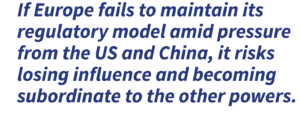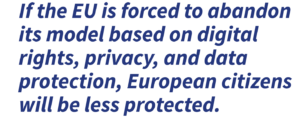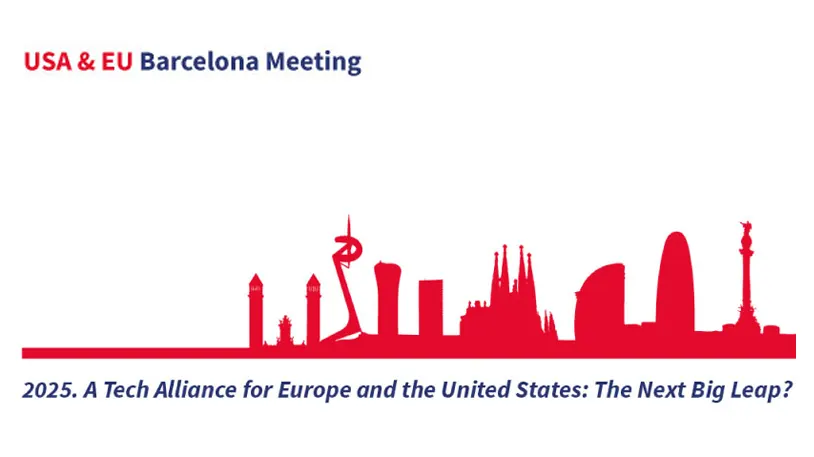Javier Borràs: “Artificial Intelligence is a weapon for geopolitical competition that is redefining economic, military, and strategic power on a global scale”

Javier Borràs Arumí is a researcher and editor at CIDOB, specializing in the impact of emerging technologies on democracy and geopolitical competition. With experience in institutions such as the European Commission and the Center for the Study of Democracy, as well as international media, he has closely analyzed the dynamics between the European Union, China, and the United States in the technological field.
In the context of the Barcelona Meeting 2025, where the technological and regulatory challenges faced by the EU and the US will be debated, the future of digital governance is emerging as a key issue. Artificial Intelligence, quantum computing, and (de)regulatory pressure are shaping a competitive landscape between major global powers.
Today, we speak with Javier Borràs about these challenges and how technology has become a determining factor in international relations, innovation, and global security.
Which are the major technological challenges facing Europe?
Europe is facing significant issues. The first is the ability to defend its own technological model against the two major powers: The United States, which follows a free-market model, and China, where the State has a central role in technological development. Europe has built its strategy around regulation and the protection of digital rights for its citizens, but pressure from these global powers is putting the viability of this model into question.
Which weaknesses does the European system have?
Innovation is one of Europe’s biggest gaps, as the EU lacks major tech companies comparable to those in the US or China. This is not only due to regulation but also to a lack of scale and an ecosystem which favors entrepreneurial risk less. Another important challenge is how the EU will balance security and economic growth. A few years ago, free markets and globalization were the main priorities, but now security has taken center stage, particularly in technology, with an increasingly geopolitical focus.
Can Europe maintain its own technological model?
 It is difficult because there is growing pressure to adapt to the standards of other great powers, especially the USA. Europe’s comparative advantage in the technological field has been its strong regulations, what is known as the “Brussels effect”: when the EU removes a regulation, its market is large enough that companies from across the world have strong incentives to adapt. Now the question is whether it can maintain this competitive advantage, in a context of pressure and threats from Trump that the EU does not regulate or investigate the American technology giants.
It is difficult because there is growing pressure to adapt to the standards of other great powers, especially the USA. Europe’s comparative advantage in the technological field has been its strong regulations, what is known as the “Brussels effect”: when the EU removes a regulation, its market is large enough that companies from across the world have strong incentives to adapt. Now the question is whether it can maintain this competitive advantage, in a context of pressure and threats from Trump that the EU does not regulate or investigate the American technology giants.
How does the Trump-Silicon Valley alliance affect this balance?
It’s a concerning issue. Trump has established a close relationship with Silicon Valley: many big US tech companies backed him after he won the election, with the idea that he would reduce regulations at the US level and pressure the EU to be laxer on them. If the EU gives way in this field, I think it will be a mistake, because regulation is almost the only tool the EU has to influence the global technology scene. Pushing it aside – to try to negotiate with Trump on issues such as tariffs – may end up weakening Europe’s role in this crucial sector which is technology.
Why doesn’t Europe have major tech companies like the US or China?
The US and China have significantly larger markets, while the EU is fragmented and lacks a unified digital market, or a common capital market. This makes it harder for European companies to scale up and become global tech leaders. Additionally, there are cultural differences: in the US and China, taking entrepreneurial risks is seen more positively, whereas in Europe, there is a greater aversion to risk and a less innovation-driven business culture. Something that is reflected in our regulations or in the absence of a sufficiently large venture capital sector.
Why is security taking precedence over the economy in the tech world?

A few years ago, globalization and free markets were the key global paradigms. Now, security has become the predominant perspective, especially in the technological field. Governments view technology as a tool of power and geopolitical competition. This has led to a much more restrictive approach, where the “weaponization” of technology—how tech tools can be used as power weapons in international relations—is increasingly discussed.
What do you mean by “weapons”?
Apps like TikTok or X, or allowing a rival to get advanced chips or develop cutting-edge AI, for example, are seen as potential threats to national security. This limits international cooperation and innovation: technological development is seen as an arms race and a zero-sum game. Technology has always been linked to power and the military. But I think the most important recent change happened after 9/11, when it was observed that global communication flows could be used for surveillance, control and coercion. The data that crossed the globe was not only useful for the business success of large technology companies, but also for intelligence, surveillance and national security operations.
Is Europe losing its autonomy in this scenario?
Yes, the EU’s room for action is limited, and one of its main strengths, regulatory capacity, is in danger of losing its influence. Apart from strengthening its own capacities, there is also the option of negotiating and establishing agreements where consensus and agreements are sought. Traditionally, this is what has been done with the USA, a historical ally with common values with Europe. Despite the fact that the Biden administration has exerted unilateral pressure in some areas, there have been spaces for negotiation and the search for consensus with European positions. But it seems that with Trump this will end, since his style is to negotiate through threats and economic coercion.
What role does regulation play in Trump’s international strategy?
For Trump, in many cases, regulation is not a tool to establish clear rules or protect rights, but a bargaining chip. We have seen this in the case of TikTok. Instead of applying a coherent technology policy, he uses the ability to impose or relax regulations in a transactional way to pressure other countries and companies according to his interests. Trump doesn’t like regulations or bureaucracy. But both are necessary if you want to carry out sanctions, export controls or impose tariffs. In the long term, removing technocrats from what Trump calls the “deep state” will reduce America’s international power.
How does all of this impact European citizens and businesses?

If the EU is forced to abandon its model based on digital rights, privacy and data protection, European citizens will be less protected, especially in the face of US tech giants. The case of China worries me less, because – partly due to pressure from the United States – the EU is tougher and more vigilant with Chinese technologies and they now have less power of influence. On the other hand, pressure from Trump and Silicon Valley that the EU does not apply regulations such as the Digital Markets Act can favor technological oligopolies, which can harm small companies and start-ups, both European and American.
Will Europe follow a unified strategy, or will individual countries act independently?
In principle, the idea is to act together, but the reality is that, faced with the uncertainty surrounding the United States, each country is starting to go its own way. Europe is divided between the countries of Eastern Europe, for which a strong relationship with the United States is vital because of the war in Ukraine, and those of Western Europe, which are more critical of the US. This fragmentation can also be transferred to the technological field, with some countries using technology as a transactional element rather than following a unified strategy at the European level.
What role does technology play in international relations?
Technology has become a fundamental tool of power. The ongoing competition between the US and China is centered on technology, particularly Artificial Intelligence. The US is imposing restrictions on the export of advanced chips to slow the development of Chinese AI, because it believes that if China achieves AI more advanced than the American one, this would have strong economic, military and security repercussions. In fact, more and more there is the mentality that the country which dominates the big technologies will be the country which dominates at the global level.
How does this affect the military sphere?

Artificial Intelligence is reshaping warfare through autonomous systems, data-driven decision-making, and cybersecurity operations. The US and China are competing to dominate this technological revolution, as AI leadership could provide a decisive military advantage. US restrictions on advanced chips seek to slow Chinese progress, but controlling that these chips are not actually used by China is not easy. There is a huge black market for chips, and China has been able to access training AI using the cloud of data centers in Southeast Asian countries. There is also a danger: when you cut off access to American technology in China, you create strong incentives for Beijing to build and autonomous technological system, where the ability to influence is much less.
Is AI really a “game changer,” or is there exaggeration?
There is a lot of speculation about AI and its future impact. Some view it as a revolution on par with the steam engine or electricity, while others believe it won’t be as transformative. What is clear is that many governments and companies are making decisions based on the idea that AI will be crucial. This has triggered a technological race where nations compete to stockpile chips and built data centers. It remains to be seen whether AI will truly meet all expectations or if we are witnessing a bubble.
In this scenario, what does the future hold for Europe in the tech sector?
Europe is at a crossroads. If it fails to maintain its regulatory model amid pressure from the US and China, it risks losing influence and becoming subordinate to the other powers. The lack of innovation and a unified digital market limits the competitiveness of European businesses, while security concerns increasingly conflict with free market policies. The key will be whether the EU can act cohesively and balance regulation, innovation, resistance and cooperation without losing its autonomy.







